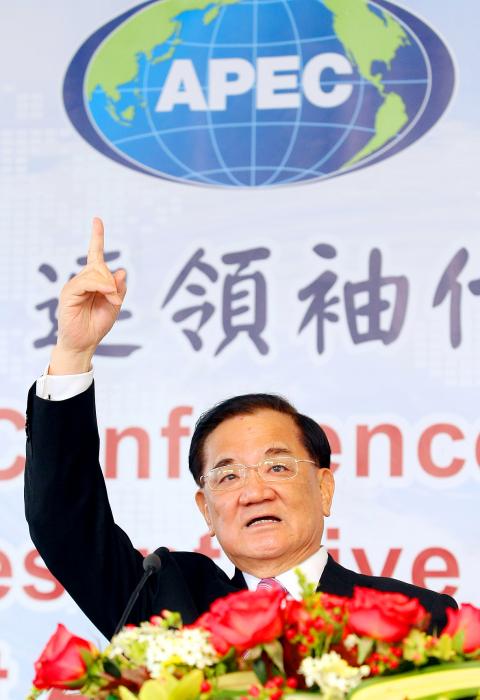|
Clinton calls for
Japan, China to avoid conflict
TERRITORIAL ROWS: The Japanese and Chinese heads
failed to hold customary talks on the sidelines of the summit as a dispute over
the Diaoyutais poisons ties
AFP, VLADIVOSTOK, Russia

Presidential envoy Lien Chan
talks about the results of his participation at the APEC summit in Vladivostok,
Russia, at a press conference yesterday.
Photo: CNA
Increasingly tense territorial rows in the
Asia-Pacific region threaten the global economy, US Secretary of State Hillary
Rodham Clinton warned yesterday at the end of an APEC leaders’ summit plagued by
divisions.
The annual gathering of APEC heads was meant to build goodwill and long-term
efforts to tear down trade barriers within the bloc, which accounts for more
than half of the world’s economic output.
While progress was made on cutting tariffs on environmentally friendly goods and
commitments renewed to fight protectionism, bitter territorial disputes
disrupted the two-day event in Russia’s port city of Vladivostok.
Japanese Prime Minister Yoshihiko Noda and Chinese President Hu Jintao (胡錦濤) did
not hold customary talks on the summit sidelines because of a row. Similarly,
Noda and South Korean President Lee Myung-bak — both allies of Washington —
shunned each other.
Philippine President Benigno Aquino III also failed to meet with Hu, after
declaring it his top priority beforehand.
The Philippines and China have endured months of bruising diplomacy over
competing claims to the South China Sea — of which Beijing claims almost all —
including a maritime standoff.
“Now is the time for everyone to make efforts to reduce the tension and
strengthen the diplomatic involvement,” Clinton, who was filling in for US
President Barack Obama, told reporters as she prepared to leave Vladivostok.
“This region of the world is the economic engine in what is still a fragile
global economy.”
“It’s not in the interest of the Asian countries, it’s certainly not in the
interest of the United States or the rest of the world, to raise doubts and
uncertainties about the stability and peace in the region,” she said.
Clinton urged Seoul and Tokyo to “lower the temperature” over sparsely populated
islands known as Dokdo in South Korea and as Takeshima in Japan, but controlled
by South Korea and where Lee made an unprecedented visit last month.
Japan’s relations have also deteriorated anew with China over competing claims
to the Diaoyutai Islands (釣魚台) in the East China Sea.
APEC spans the Pacific Rim, from China to Chile, and includes the world’s
three-biggest national economies — the US, China and Japan — with its 21 members
accounting for 44 percent of the world’s trade.
In their final summit statement, the leaders pledged to help boost the sluggish
global economy by strengthening demand in their own countries, cutting public
debt and committing to no new trade barriers.
Meanwhile, Taiwan’s envoy to the APEC meeting, former vice president Lien Chan
(連戰), yesterday said the formation of a code of conduct in the South China Sea
should not exclude Taiwan, a proposition to which many of the representatives at
the APEC summit meeting agreed.
Lien, representing President Ma Ying-jeou (馬英九), met with ASEAN members to
discuss sovereignty issues in the South China Sea.
Taiwan’s principle concerning the South China Sea issue — that its sovereignty
belongs to Taiwan, that Taiwan is willing to peacefully share the resources
therein and that all parties involved should lay aside their differences and
embark on a joint venture to develop resources in the region — is clear-cut and
has not wavered, he said.
Many of the countries involved hope that talks over the South China Sea can
commence as soon as possible and that a code of conduct should be formed, Lien
said.
“We have also said expressly that Taiwan should be one of the main parties
invited to the talks,” he said.
Itu Aba Island (Taiping Island, 太平島) and the Zhongzhou Reef (中洲礁) — both part of
the Spratly Islands (Nansha Islands, 南沙群島) and governed by Taiwan — are
strategically located, Lien said.
If talks were to commence without inviting Taiwan, any code of conduct would not
have any basis in reality, Lien said.
“I can’t say all the economic bodies in the region agreed, but there were many
that did,” Lien said.
The talks for a code of conduct first began after the signing of the Declaration
on the Conduct of Parties in South China Sea in Phnom Penh by China and ASEAN
member states, but because of concerns over national sovereignty, the subsequent
talks and signing of an actual code of conduct for the South China Sea have not
yet been held or inked.
Additional reporting by staff writer Jake Chung
|
![]()
![]()
![]()